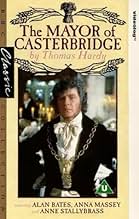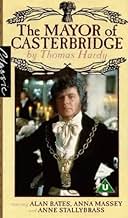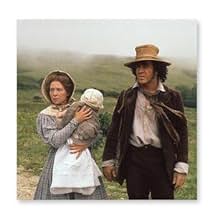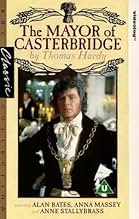CALIFICACIÓN DE IMDb
7.9/10
403
TU CALIFICACIÓN
Agrega una trama en tu idiomaDrunken Henchard sells wife at fair. Sober, he reforms, becomes mayor but past catches up when wife returns years later.Drunken Henchard sells wife at fair. Sober, he reforms, becomes mayor but past catches up when wife returns years later.Drunken Henchard sells wife at fair. Sober, he reforms, becomes mayor but past catches up when wife returns years later.
Explorar episodios
Opiniones destacadas
Another BBC masterpiece finally out on DVD. Hardy's world is shown in all its darkness, yet permeated by rays of hope. This rendition of the classic novel is brilliantly cast and well shot. You have to listen pretty hard to hear through the thick accents, but that patience is rewarded because nuances of the accents round out the characters.
Alan Bates is simply stunning as the heroic anti-hero Michael Henchard. A stupid decision made when he was a drunk 21-year-old comes back to haunt him 19 years later when the wife he sold returns to his town. The unfolding drama is about fatherhood, friendship, betrayal, and most importantly, the complexity of human characters. Bates is able to make you see inside his brain as he silently weighs courses of action between what his demons tempt him to do and what his angels urge him to do. Both sides win along the way as he redeems himself, only to then act rashly out of jealousy, embarrassment, or self-disgust.
The other characters are also well done, with Janet Maw playing the daughter who cannot understand her father until it is too late and Anna Massey playing the fallen woman who wishes to have her own life. Jack Galloway does a good job as the honest Scot, but I did not see any spark between Farfrae and Lucetta. The scenery and weather are always characters in Hardy's books, and here they enter the drama intermittently.
But this film in the end is all about Alan Bates. I love much of his other work but his Michael Henchard is the performance of a lifetime.
Alan Bates is simply stunning as the heroic anti-hero Michael Henchard. A stupid decision made when he was a drunk 21-year-old comes back to haunt him 19 years later when the wife he sold returns to his town. The unfolding drama is about fatherhood, friendship, betrayal, and most importantly, the complexity of human characters. Bates is able to make you see inside his brain as he silently weighs courses of action between what his demons tempt him to do and what his angels urge him to do. Both sides win along the way as he redeems himself, only to then act rashly out of jealousy, embarrassment, or self-disgust.
The other characters are also well done, with Janet Maw playing the daughter who cannot understand her father until it is too late and Anna Massey playing the fallen woman who wishes to have her own life. Jack Galloway does a good job as the honest Scot, but I did not see any spark between Farfrae and Lucetta. The scenery and weather are always characters in Hardy's books, and here they enter the drama intermittently.
But this film in the end is all about Alan Bates. I love much of his other work but his Michael Henchard is the performance of a lifetime.
10stancym
10 is not a high enough rating for this masterpiece. Even as we see the gorgeous and extremely talented Alan Bates as the mayor, making mistake after mistake, acting like a fool, struggling with his conscience, and sometimes making things right only to screw up again, we are moved by him. We have pity for a man who cannot get out of his own way, who is his own worst enemy.
The acting is superb, the scenery/sets beautiful and fitting of the time and place. Often meanings are conveyed through looks, expressions, and not an excess of words. The score by Carl Davis is appropriate and adds to the feel of the series, enhancing the whole thing.
What luck that this is on DVD, complete with biographies on Sir Alan Bates and Thomas Hardy, among other things. Don't miss this gem.
The acting is superb, the scenery/sets beautiful and fitting of the time and place. Often meanings are conveyed through looks, expressions, and not an excess of words. The score by Carl Davis is appropriate and adds to the feel of the series, enhancing the whole thing.
What luck that this is on DVD, complete with biographies on Sir Alan Bates and Thomas Hardy, among other things. Don't miss this gem.
This brilliant adaption of a typically grim hardy novel was filmed in Corfe Castle, Dorset, but is set in Dorchester (aka Casterbridge). Given that it is 45 years old and it stands up well. Technically. Bates is of course the star. Sadly, Farfrae and Lucetta are poorly caste (the newer version being much better) but it is good to see the story told as written (mostly) and no one afraid to take a long time about it. It shows a man recovering from an early failure of character, who then does well. But then he lets himself down again and starts to fail. He makes a recovery of sorts, only to let himself (and others) down again. In short. This is a story about karma and how we control our own fortune. For those of us who are able to concentrate for an extended period of time it is well worth agonising over his life.
Please pardon the substandard Americanism, but "who'd a thunk" that the insanely imaginative bete noire of British television writing, Dennis Potter, could have written such a disciplined, book-faithful, beautifully-paced script as this. He pays full and respectful homage to the great Thomas Hardy's masterpiece.
No repetition of the accolades of prior reviewers is needed here. They're spot on.
What I would like to see, if I had control of casting of both the 1978 and 2003 versions, is a redistribution of the cast. For this exercise, I need a time warp.
Understanding, for example, that Polly Walker, who plays Lucetta in 2003, was only 12 years old in 1978, I would have preferred her (as she was in 2003) to Anna Massey as Lucetta in 1978. Walker has some beauty and magnetism and is believable as a man- hungry "fallen woman." Massey was undeniably an excellent actress, but as a vamp she simply can't cut it. To think Farfrae or Henchard could be attracted to her sensually is laughable. The suspension of disbelief here is too much for me to make. (By the way, her miscasting as Laura in the Pallisers is equally disturbing, as there is NO spark between her and Donal McCann in that series.)
Then I'd grab Juliet Aubrey out of the 2003 version and cast her in place of Anne Stallybrass - Aubrey portrays Susan more sensitively, more skilfully.
Janet Maw is superb as Elizabeth-Jane, so I'd leave her there, and not import Jodhi May into 1978 - May is too stilted as E-J. Both Purefoy and Galloway are very good as Farfrae, but Goodman is so very good in the minor role of Jopp that I would pull him out of 2003 to replace Lacey,
And last, I leave it to you as to Hinds or Bates as Henchard. They both turn in the most remarkable performances of their careers in Mayor of C. And that's why it's such a pleasure to watch both versions. despite the dreadful editing of Hardy in 2003.
No repetition of the accolades of prior reviewers is needed here. They're spot on.
What I would like to see, if I had control of casting of both the 1978 and 2003 versions, is a redistribution of the cast. For this exercise, I need a time warp.
Understanding, for example, that Polly Walker, who plays Lucetta in 2003, was only 12 years old in 1978, I would have preferred her (as she was in 2003) to Anna Massey as Lucetta in 1978. Walker has some beauty and magnetism and is believable as a man- hungry "fallen woman." Massey was undeniably an excellent actress, but as a vamp she simply can't cut it. To think Farfrae or Henchard could be attracted to her sensually is laughable. The suspension of disbelief here is too much for me to make. (By the way, her miscasting as Laura in the Pallisers is equally disturbing, as there is NO spark between her and Donal McCann in that series.)
Then I'd grab Juliet Aubrey out of the 2003 version and cast her in place of Anne Stallybrass - Aubrey portrays Susan more sensitively, more skilfully.
Janet Maw is superb as Elizabeth-Jane, so I'd leave her there, and not import Jodhi May into 1978 - May is too stilted as E-J. Both Purefoy and Galloway are very good as Farfrae, but Goodman is so very good in the minor role of Jopp that I would pull him out of 2003 to replace Lacey,
And last, I leave it to you as to Hinds or Bates as Henchard. They both turn in the most remarkable performances of their careers in Mayor of C. And that's why it's such a pleasure to watch both versions. despite the dreadful editing of Hardy in 2003.
This grim BBC miniseries is hard on ears belonging to non-British viewers who aren't already familiar with the Thomas Hardy source novel, so thick are the regional accents, so muffled is the soundtrack, and so lackadaisically introduced are some of the plot developments. Whether you can understand all of his utterances or not, Alan Bates gives a robust performance in the lead, his second foray into Hardy territory, several years after his incarnation as sheep farmer Gabriel Oak in John Schlesinger's "Far from the Madding Crowd." Henchard is far less appealing than Oak and it's difficult to warm to such a man although you can respect him for rising from the mess he makes of his youth to prominence and commercial success in middle age. Bates barks most of his lines as if to emphasize his character's simplicity and lack of finesse. His outbursts of rage and drunken excess are brilliantly effective. There is nothing likable about him but we can empathize with his plight, that of an ordinary man with strengths and weaknesses who was unlucky enough to make a major mistake early in life that eventually overshadowed all that was to come.
This adaptation by Dennis Potter takes some liberties with the twisty, coincidence-laden plot, and not always to good effect, though it's hard to tell how much was written out as opposed to how much was cut after shooting. The casting of supporting roles is apt; these are not glamorous people, but ordinary rural folk of the mid-19th century, and all of the actors who play these roles fully bring their homely characters to convincing and persuasive life, aided by the liberal use of closeups and long takes. Jack Galloway is particularly impressive as goodhearted, trusting Donald Farfrae, the Scotsman who is forcefully befriended by Henchard, only to become his undoing. Strangely, the germination and blossoming of their relationship, so clearly laid out in the novel, is skipped and introduced full-blown like an afterthought, which not only removes the fatalistic element but becomes another of several inexplicable plot shifts that viewers must accept as a given. The piling up of these arbitrary developments weaken the presentation. Like Schlesinger's "Crowd" before it, the physical production convincingly replicates the era in question, down to costume and furnishings and the population of grizzled locals seen at pubs and markets and stables. Interiors look like they were shot in the actual cramped, underlit, claustrophobic dwellings the characters inhabited. Carl Davis's somber, spare score complements the tone without getting in the way.
A boom mike is clearly visible in one parlor scene and shadows of booms appear occasionally in other scenes. At times characters run over each other's lines in a way that mimics actual non-rehearsed speech but could also be gaffes that were left intact due to budget or schedule concerns. On the whole it looks like a modestly financed production whose every penny was wisely invested in the period furnishings and costumes. Good use is made of the melancholy, windswept countryside.
This adaptation by Dennis Potter takes some liberties with the twisty, coincidence-laden plot, and not always to good effect, though it's hard to tell how much was written out as opposed to how much was cut after shooting. The casting of supporting roles is apt; these are not glamorous people, but ordinary rural folk of the mid-19th century, and all of the actors who play these roles fully bring their homely characters to convincing and persuasive life, aided by the liberal use of closeups and long takes. Jack Galloway is particularly impressive as goodhearted, trusting Donald Farfrae, the Scotsman who is forcefully befriended by Henchard, only to become his undoing. Strangely, the germination and blossoming of their relationship, so clearly laid out in the novel, is skipped and introduced full-blown like an afterthought, which not only removes the fatalistic element but becomes another of several inexplicable plot shifts that viewers must accept as a given. The piling up of these arbitrary developments weaken the presentation. Like Schlesinger's "Crowd" before it, the physical production convincingly replicates the era in question, down to costume and furnishings and the population of grizzled locals seen at pubs and markets and stables. Interiors look like they were shot in the actual cramped, underlit, claustrophobic dwellings the characters inhabited. Carl Davis's somber, spare score complements the tone without getting in the way.
A boom mike is clearly visible in one parlor scene and shadows of booms appear occasionally in other scenes. At times characters run over each other's lines in a way that mimics actual non-rehearsed speech but could also be gaffes that were left intact due to budget or schedule concerns. On the whole it looks like a modestly financed production whose every penny was wisely invested in the period furnishings and costumes. Good use is made of the melancholy, windswept countryside.
¿Sabías que…?
- TriviaThis was one of the first major British television dramas to be shot entirely on videotape, using the new generation of portable video cameras and equipment for location footage. However, it was by no means the first BBC drama to do this, as series such as Doctor Who (1963) and Survivors (1975) had already used video for location footage as early as 1974-75.
- ConexionesEdited into Masterpiece Theatre: The Mayor of Casterbridge: Part 1 (1978)
Selecciones populares
Inicia sesión para calificar y agrega a la lista de videos para obtener recomendaciones personalizadas
- How many seasons does The Mayor of Casterbridge have?Con tecnología de Alexa
Detalles
Contribuir a esta página
Sugiere una edición o agrega el contenido que falta

Principales brechas de datos
By what name was The Mayor of Casterbridge (1978) officially released in Canada in English?
Responda


































